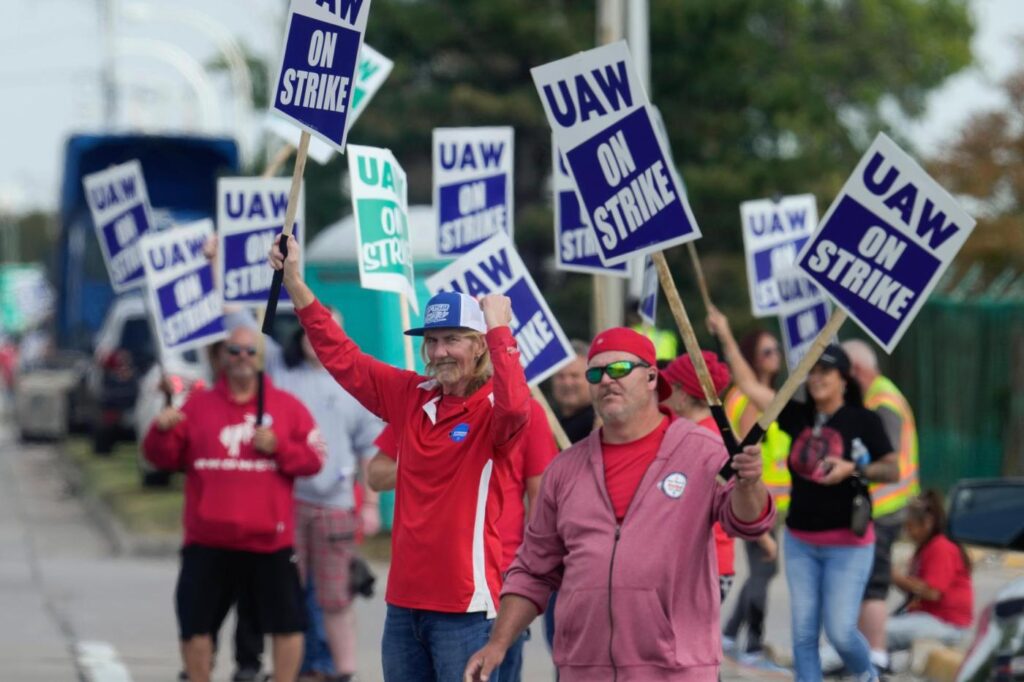
By DAVID KOENIG | AP Business Writer
The auto workers’ strike against Detroit’s Big Three went into its fourth day with no signs of an early breakthrough and against the threat that the walkout could soon spread.
A spokesman for General Motors said that representatives of the company and the United Auto Workers were continuing to negotiate on Monday.
So far the strike is limited to about 13,000 workers at three factories — one each at GM, Ford and Stellantis. GM warned, however, that 2,000 UAW-represented workers at an assembly plant in Kansas City are “expected to be idled as soon as early this week” because of a shortage of supplies from a GM plant near St. Louis, where workers walked off the job Friday.
Workers at the Kansas City plant build the Chevrolet Malibu and Cadillac XT4.
Treasury Secretary Janet Yellen said she is hoping for a quick resolution, and that it is too soon to gauge the impact of the strike.
“It’s premature to be making forecasts about what it means for the economy. It would depend on how long the strike lasts and who would be affected by it,” she said on CNBC.
Yellen said labor activism this year — strikes by Hollywood writers and actors, by workers at about 150 Starbucks locations and walkouts that were narrowly averted at United Parcel Service and West Coast ports — has been driven by a strong labor market and high demand for workers.
In a sign of the potential economic and political of a long strike, President Joe Biden is sending two top administration officials to Detroit this week to meet with both sides. Biden has sided with the UAW in brief public comments, saying that the automakers have not fairly shared their record profits with workers.
An administration official said Monday that acting Labor Secretary Julie Su and senior aide Gene Sperling will not serve as mediators — they won’t be at the bargaining table — but are going to Detroit “to help support the negotiations in any way the parties feel is constructive.” The official was not authorized to discuss private discussions and spoke anonymously.
UAW President Shawn Fain said Monday that the Biden administration won’t broker a deal.
“This is our battle. Our members are out there manning the picket lines,” Fain said on MSNBC. “This battle is not about the president, it’s not about the former president.”
The UAW is seeking wage increases of 36% over four years, while the companies have offered about 20%. The union is also demanding a 32-hour work week for 40 hours of pay, and other changes.
Rather than launching an all-out strike of its 146,000 members, the union opted to target three factories a plan that could make the union’s $825 million strike fund last longer. Workers walked out of a GM plant in Wentzville, Missouri, a Ford plant near Detroit, and a Stellantis factory in Toledo, Ohio, that produces Jeeps.
A key feature of the UAW strategy is the threat of escalating the strike if the union is unhappy with the pace of bargaining. On Friday, Fain said more factories could be targeted: “It could be in a day, it could be in a week.”
UAW strike
UAW worker: ‘These jobs were gold standard’
UAW workers at Ontario parts distribution center poised to strike
What’s at stake as 13,000 workers go on strike at major US auto makers
13,000 autoworkers go on strike seeking better wages and benefits
‘Can’t be understated’: Suppliers, dealers brace for impact of a UAW strike at automakers
